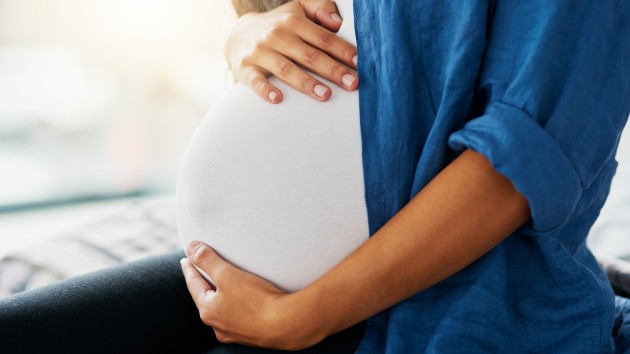
Adene Sanchez/iStock(NEW YORK) — Being pregnant amid a global outbreak of a virus with no known treatment or vaccine is not exactly comforting.
The outbreak of coronavirus, or COVID-19, as it’s officially known, has led pregnant women to question everything from whether they should travel to whether they should work from home, self-quarantine or are fine to continue their lives as normal.
In the past two months, nearly 120,000 cases of coronavirus have been diagnosed around the world.
Here are some questions answered about pregnancy and the coronavirus:
1. Are pregnant women a higher risk?
Experts don’t know.
Because COVID-19 is a new virus, there are no published scientific reports on whether pregnant women are more susceptible than the general population. The U.S. Centers for Disease Control and Prevention does point out though that pregnant women do have weakened immune systems and may be more susceptible to viral respiratory infections, including COVID-19.
Based on data from previous coronaviruses, like SARS and MERS, some experts believe pregnant women may be at higher risk for severe illness and death, but that data is limited and inconclusive.
For now, neither the CDC nor the American College of Obstetricians and Gynecologists recommends any specific guidance for pregnant women beyond what’s recommended to the general public.
2. What precautions should pregnant women take?
The CDC recommends the general public, including pregnant women, take “everyday preventive actions” to help stop the spread of germs, including getting a flu vaccine, washing your hands, avoiding touching your eyes, nose and mouth, staying home when sick and avoiding close contact with people who are sick.
Further precautions, including avoiding crowds and stocking up on supplies, are recommended only for older people or people with severe chronic conditions like diabetes, heart disease and lung disease.
In terms of the transmission of coronavirus, the virus has been spreading from person to person.
Person-to-person transmission is most likely between people in close contact, within about 6 feet. When a person infected with novel coronavirus sneezes or coughs, respiratory droplets could land on people nearby or possibly be inhaled by those people.
3. Should pregnant women travel?
There is no guidance that pregnant women should not travel, so it’s ultimately a personal decision.
Pregnant women should consult with their doctors first. Factors to consider include where you’re considering traveling, how far along in your pregnancy you are and what your backup plan would be.
In addition to considering whether the country in question has seen a significant influx of COVID-19 cases, think about the situation on ground. Has travel within the country been disrupted? How would you feel about potentially being quarantined upon returning to the United States? Is there a risk you could be grounded due to canceled flights or quarantines and not be able to travel home? Would you have access to medical care at your destination?
The U.S. State Department provides travel advisories that include up-to-date recommendations about which countries have reported cases of COVID-19 and how widespread infections have been. The situation is fluid and rapidly evolving, so you should check back often and use that information to inform what’s essentially a personal decision.
4. Should pregnant women go to the hospital if they feel symptoms?
Pregnant women should call their doctor before going to the hospital if showing symptoms. A hospital visit is not always necessary and could put you at risk for exposure to other sicknesses. If you are having problems breathing you should seek medical help immediately.
Novel coronavirus can cause symptoms ranging from mild to severe, including cough, fever and shortness of breath. Since the symptoms are similar to those of pneumonia, influenza and the common cold, only a diagnostic test can confirm whether an individual has coronavirus.
5. Is it safe to go to doctors’ appointments?
The CDC and ACOG have not issued guidelines advising pregnant women to quarantine themselves or avoid going to places like doctors’ offices.
Of course, call your doctor ahead of time if you are concerned about the visit and would like to know the precautions they are taking. Then, take the normal precautions advised by the CDC for people in general, including washing your hands.
6. Can coronavirus be transferred to the fetus?
It’s unknown whether a pregnant woman with coronavirus could pass the virus to her fetus before, during or after delivery, according to the CDC.
There are a few recent cases of infants born to women with coronavirus, and in those cases, none of the infants have tested positive for the virus that causes COVID-19, according to the CDC.
7. Should pregnant women wear a face mask?
Not unless you’re already sick.
The CDC doesn’t recommend any healthy person wear a mask, and doctors warn fiddling with putting on and taking off a mask could backfire by exposing germs on your hands to your face.
8. Is it safe for a mom with coronavirus to breastfeed?
If a mom is diagnosed with COVID-19, she should talk with her health care provider and family about whether to continue breastfeeding, according to the CDC.
The CDC does not have official guidance on whether to continue breastfeeding with confirmed coronavirus because so much is unknown still about the virus.
For context, when it comes to the flu, CDC recommends moms continue breastfeeding or feeding expressed breast milk while taking precautions to avoid spreading the virus to the baby.
Moms also should wash their hands before touching their babies and, if sick, wear a face mask while breastfeeding.
If a mom with coronavirus is pumping milk, the mom should take precautions, including washing her hands, when touching and cleaning the breast pump. The CDC also recommends having someone who is not sick feed the baby the pumped breast milk, if possible.
Copyright © 2020, ABC Audio. All rights reserved.
